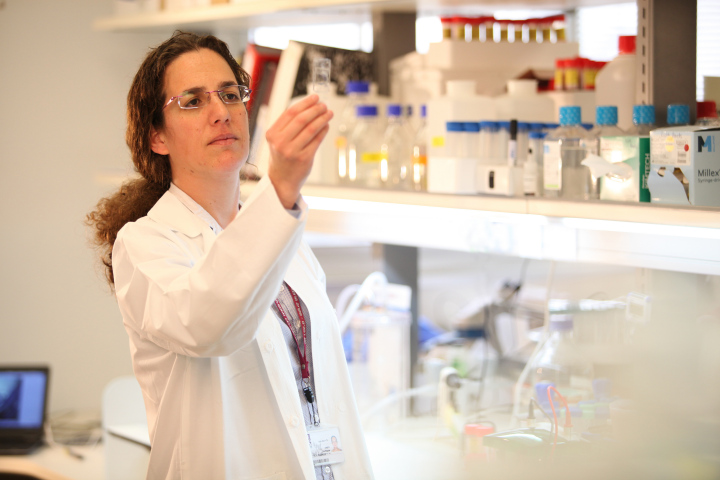Biomica’s immuno-oncology program is based on the premise that the gut microbiome affects the efficacy of cancer immunotherapy. The study is pending approval by Israel’s Ministry of Health.
 Dr. Ruth Perets at work in her lab at Rambam. Photography: Rambam HCC
Dr. Ruth Perets at work in her lab at Rambam. Photography: Rambam HCC
Rambam Health Care Campus recently signed a clinical trial agreement with Evogene Ltd. subsidiary Biomica Ltd., an emerging biopharmaceutical company developing innovative microbiome-based therapeutics for initiating a first in-human proof-of-concept (POC) for BMC128, Biomica’s drug candidate.
The study is designed primarily to evaluate the safety and tolerability of Biomica’s microbiome-based immuno-oncology drug for patients with non-small cell lung cancer, melanoma, or renal cell carcinoma. The study is being carried out in combination with immune checkpoint inhibitor (ICI) immunotherapy. Immune checkpoints prevent immune responses from being so strong that they destroy healthy cells in the body.
Dr. Ruth Perets, Deputy Director of the Division of Oncology, Director of Phase 1 Clinical Trials in Oncology, and Head of the Women’s Cancer Research Lab, stated, “We are thrilled to lead this clinical trial, aiming to target the important issue of ICI resistance. Immune checkpoint inhibitors have revolutionized the field of oncology, providing prolonged survival in many malignancies. However, resistance to ICI eventually occurs in most patients, and evidence suggests that the gut microbiota (microorganisms, including bacteria, that live in the digestive tracts of humans) plays a role in ICI resistance. We are excited to the test the ability of BMC128 to overcome ICI resistance and help provide patients with meaningful and long responses to treatment.”
Dr. Elran Haber, the CEO of Biomica, said, “We are very excited to work with one of Israel’s leading healthcare institutions, Rambam Health Care Campus, and we look forward to initiating our first in-human POC study for BMC128. Based on the compelling preclinical results achieved to date, we are thrilled to take this next step in advancing BMC128 through the clinical development process. We hope that this important collaboration will be followed by further partnerships with additional leading medical institutions.”

